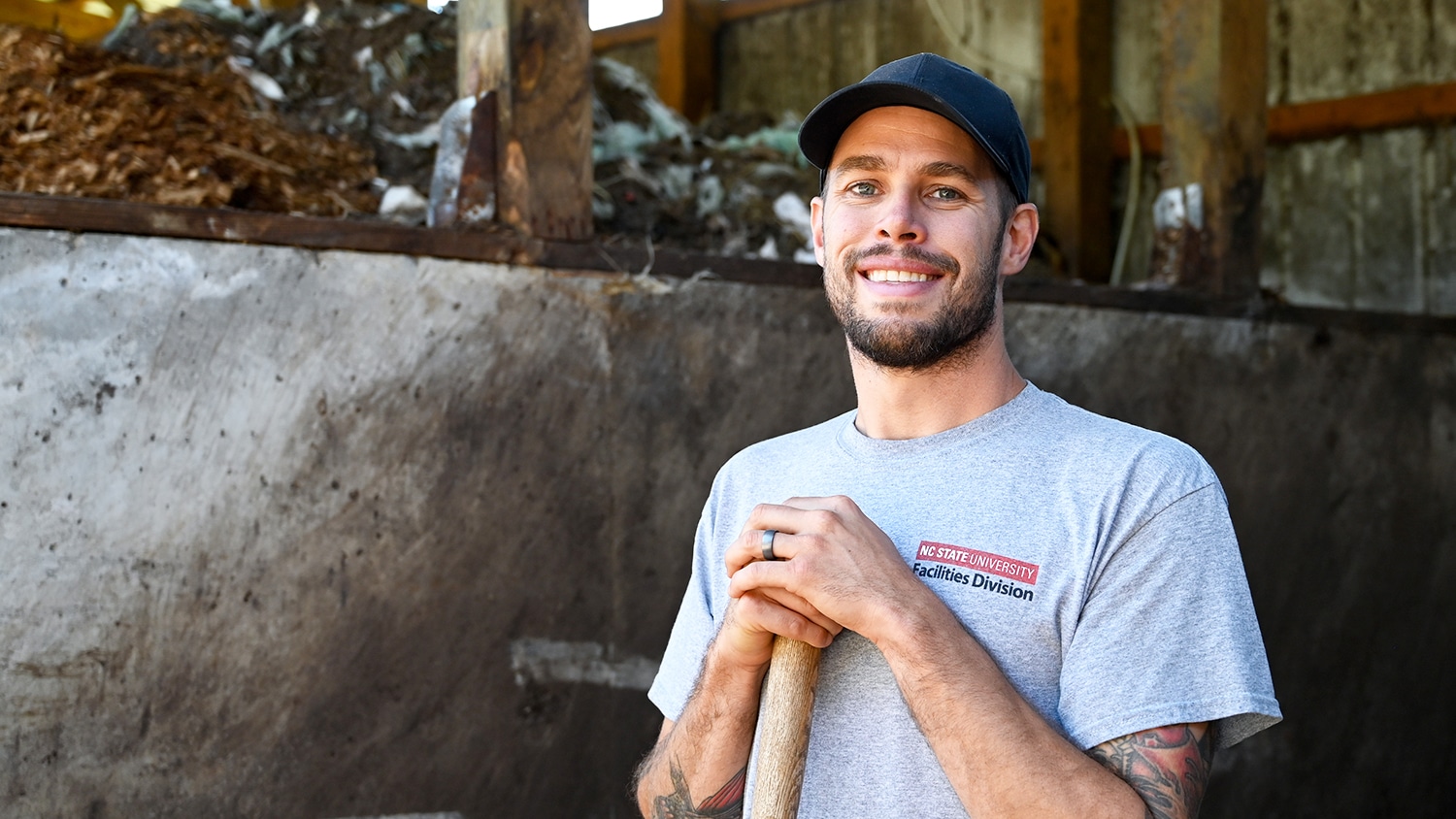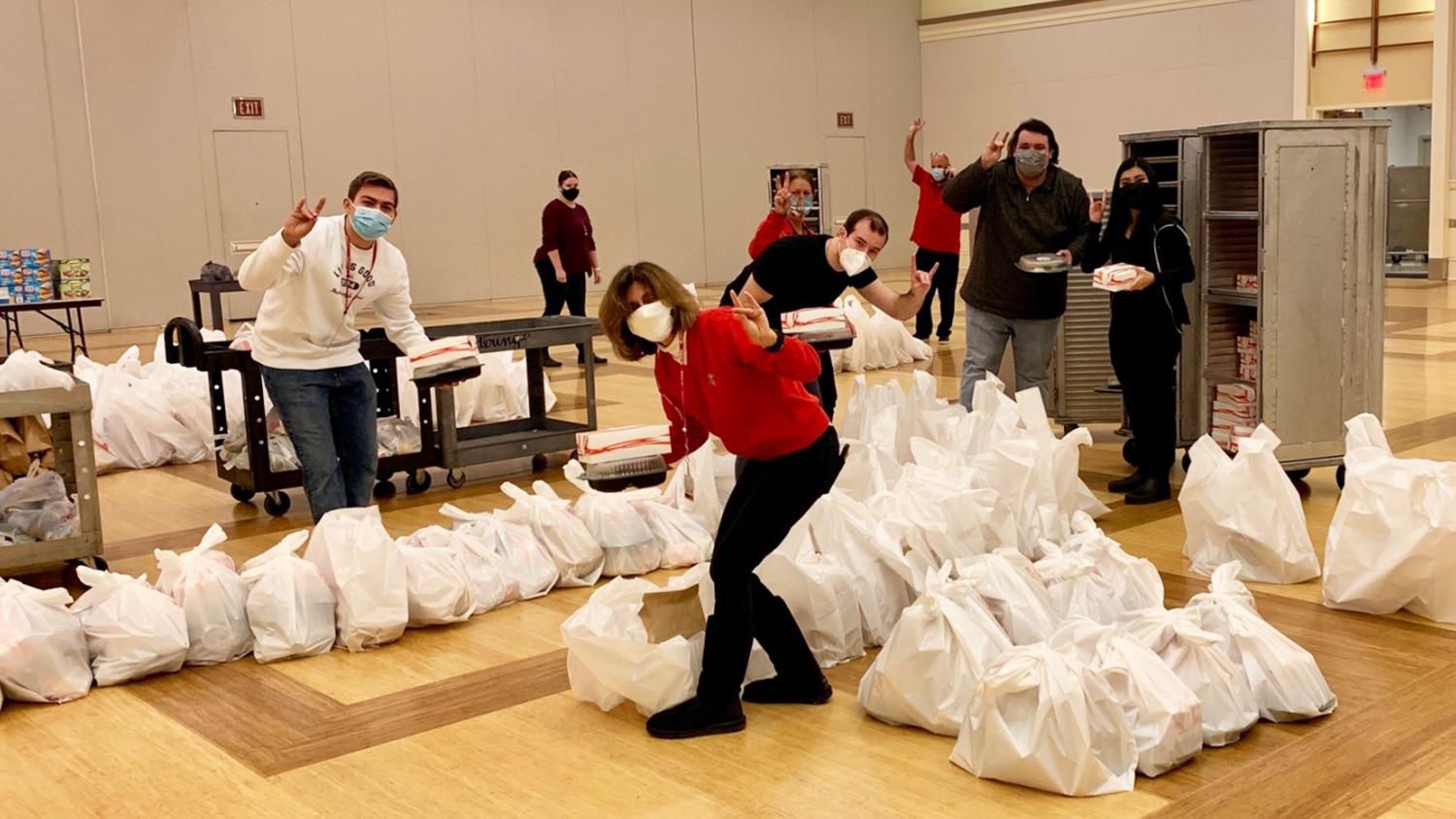Answering the Call
Faculty member Lisa Chang — who is also a registered pharmacist — helps administer the COVID-19 vaccine across North Carolina.

By Lea Hart
Poole College of Management’s Lisa Chang is working on the front lines in the effort to distribute the COVID-19 vaccine rapidly across North Carolina to as many people as possible.
Chang, director of the Technology Entrepreneurship and Commercialization (TEC) program, and a lecturer in the department of Management, Innovation, and Entrepreneurship, is also a registered pharmacist who has worked tirelessly between semesters, traveling across central North Carolina to administer the vaccine.
Currently North Carolina is in Phase 1 of its distribution plan, meaning Chang’s work is centered on administering the vaccine to the elderly and most vulnerable in nursing homes and long term care facilities, as well as the staff that care for them. She is a relief pharmacist for Walgreens, where she works periodic shifts, and is also a volunteer immunizer for North Carolina’s Department of Health and Human Services. Since Walgreens and CVS are two of the largest pharmacy chains involved in the vaccination campaign, Chang was given the opportunity to pitch in and help.
“There was an all call for people who were interested, to make sure they have enough personnel to get through nursing homes and long term care facilities,” she said. “I’ve traveled across North Carolina, immunizing people, and talking them through the vaccine in cases where they might be apprehensive or not sure if they want to get the vaccine.”
She anticipates being called upon to support additional vaccination clinics as North Carolina moves toward vaccination of the broader population as well.
Executing a statewide vaccination effort requires constant COVID-19 testing and can mean long days – 12 to 16 hours some days – and large numbers of people. At a recent clinic she expected her team would serve 1,600 people in one day at a single site. But Chang is enthusiastic to be on the front lines, working to bring an end to the pandemic.
It’s going to take a large majority of the population getting vaccinated for us to have the best chance to bring COVID-19 under control so that we can fully reopen campus in a safe and less restrictive manner.
“The faster we get these doses in, the faster we can move out of Phase 1 and get vaccines to the general population,” she said. “It’s going to take a large majority of the population getting vaccinated for us to have the best chance to bring COVID-19 under control so that we can fully reopen campus in a safe and less restrictive manner.”
While her graduate classes have been able to meet in person through most of the pandemic, Chang said she knows that many courses have moved to online or hybrid instruction, which is less ideal for both instructors and students whether at the undergraduate or graduate level.
Multi-industry background allows for this unique opportunity
Chang’s multi-layer professional background began in the pharmaceutical industry, most recently as a project manager with a clinical research organization, working with the distribution and supply of clinical research material. It was during that time that she decided to pursue her MBA at NC State.
“I took one of the TEC classes as an elective about 15 years ago, and I got sucked in and decided to pursue it as a concentration,” she said. Chang found the prospect of bringing innovative research from the laboratory into the marketplace intriguing and enjoyed the challenge of translating the value of scientific data into features and benefits aligned with enduring customer needs.
When she completed her MBA, she stayed on to serve as project manager for some of TEC’s internship programs and soon thereafter, became an executive in residence for the class. As she continued to take on more responsibilities, the previous director of TEC retired and Chang moved into that role. She has the unique experience of having been a student, mentor and instructor for the same course at Poole College.

Through it all, her work as a relief pharmacist has allowed her to continue to work with patients, something she said has always helped her see and understand the entire process from clinical research to impact of an approved product on the patient, even when she was only working with investigational products in clinical trials.
“I’ve always enjoyed working directly with patients over the years, but now, with the historic nature of this vaccination campaign, in trying to control the pandemic and helping us all return to normal – it’s definitely a great time for the pharmacy profession in general, and so personally rewarding,” she said.
Continuing to serve as an educator in a different role
Many people Chang meets are eager to get the vaccine. They take photos and videos as they receive their COVID-19 vaccine to post on social media or send to family.
“They’re excited to protect our communities and to protect themselves,” she said.
At the same time, as has been reported in the news, Chang encounters people who are apprehensive. They’re concerned about the rapid development of the vaccine or potential long-term effects that couldn’t be studied during the trials.
“Giving the vaccine itself is just part of the job – perhaps more important is providing people with the information that they need to take ownership and accountability for their own health decisions, to feel comfortable and help manage their expectations, and to have them understand the appropriate follow up and why it’s so important to come back to get their second dose at the right time,” Chang said.
She noted that many people don’t realize the strong safety records of the Pfizer and Moderna vaccines, which have been maintained even after over 10 million doses given in the US alone, and that the risks of COVID-19 illness are far greater than the generally mild side effects experienced with the vaccines.
However, when I was able to look at the research, I now feel very confident in the numbers that were enrolled in the trial, the safety and efficacy demonstrated, and that there were no shortcuts taken.
“I can be honest with them that I had concerns myself when the vaccines were being developed,” she said. “However, when I was able to look at the research, I now feel very confident in the numbers that were enrolled in the trial, the safety and efficacy demonstrated, and that there were no shortcuts taken.”
With 35,000-40,000 subjects enrolled in the trials, and very mild side effects in the majority of cases, Chang said she works to reassure those who may have concerns as she administers the vaccine.
She acknowledges there have been some serious allergic reactions observed worldwide, but notes they are generally in those with a history of severe allergic reactions to other things, and these patients are usually deferred from vaccination when identified through pre-vaccination questionnaires. As a safety precaution, all patients are monitored for 15-30 minutes after vaccination to ensure they are well before leaving the clinics. Otherwise, she tells patients to expect some mild pain or discomfort at the injection site, and potentially some mild cold or flu-like symptoms such as fatigue or achiness.
“All of these can be managed after vaccination by simple, over-the-counter medications like acetaminophen or ibuprofen,” she said. “This vaccine is very easy for your body to accept, and there is no actual infectious material in the two vaccines approved for use in the U.S. so people can’t get COVID-19 from them.”
It is important to receive both doses, she said, and to get the same vaccine both times, whether Pfizer or Moderna, spaced out by 21 or 28 days, respectively. The vaccines in trials demonstrated at least a 94 percent efficacy rate on average for prevention of COVID-19, and a 100 percent efficacy rate for preventing serious COVID-19 illness, the outcome all of us seek to avoid.
Back at NC State, she serves as an ambassador for the vaccine as well. Chang is currently completing her doctorate in Pharmacy and hopes to be able to help NC State navigate the process of conducting vaccine clinics on campus when the time comes.
“It’s also about just being a good colleague in general in terms of answering questions,” she said. “I’ve had to get it myself, and I want to reduce people’s anxiety about getting vaccinated – it’s only effective if a large portion of the population gets it.”
This post was originally published in Poole College of Management News.
- Categories:


